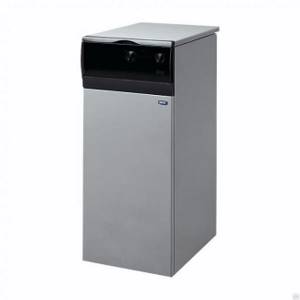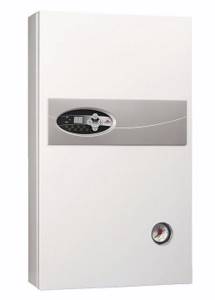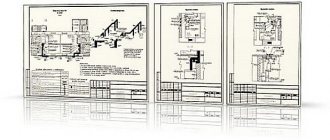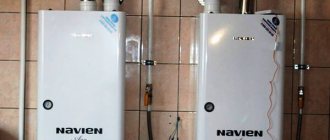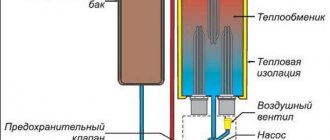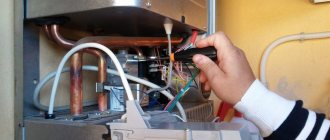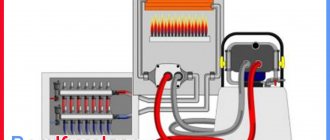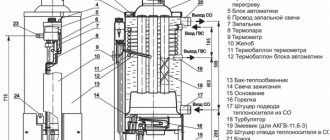When organizing autonomous heating in a private house, the owner is faced with the question of whether to choose a gas or electric boiler to maintain the desired temperature in the room in winter. Before solving it, it is necessary to understand the operating features of the units.
Which is more profitable?
Vlad Srebnyak says that the largest initial investment is for a heat pump system.
Cheaper - at a boiler room with an electric boiler. Obviously, the “dry” system looks most advantageous in comparison. But what about the long term? For example, how much will you have to spend on electricity over 10 years of operation of a heat pump? Vladislav calculated that taking into account the 10% annual increase in the price of electricity, the amount will be 5,150 rubles.
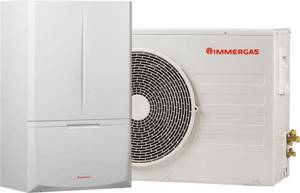
Air-water heat pump. Photo: 3t.by
Electric boilers and convectors are less economical - over 10 years of operation they will “burn” 15,450 rubles worth of electricity.
If we add the cost of equipment to these amounts, we will see that a more voracious electric boiler during operation becomes more expensive than a heat pump: the cost of equipment and electricity over ten years will be 40.3 thousand rubles versus 37 thousand.
At the same time, the “dry” system, due to the low cost of equipment, even after 10 years looks more attractive: its operation and equipment cost 19.2 thousand rubles.
Still, the home owner has a lot to think about, even if all these numbers say the obvious. “Dry” systems operate only on electricity, and it would be logical to provide an additional heat source.
Gas connection
To supply gas to your home, you will need:
- Coordination;
- Project;
- Branch from the inter-settlement highway;
- Purchase of a 38 kW boiler and technological piping;
- pipes, radiators in heated rooms, as well as work on their installation.
Total costs – 961,000 rubles.
The current tariff is 4,684 rubles per cubic meter.
Average consumption per hour is 2.4 m3. Heating this house with gas will cost 9,240 rubles.
per month .
| Conducting gas | Price |
| Coordination | 42 000 ₽ |
| Project | 119 000 ₽ |
| Diversion from the highway, entry into the house | 300 000 ₽ |
| Boiler 38 kW, technological piping | 100 000 ₽ |
| Pipes, radiators, heated floors with installation work | 400 000 ₽ |
| Total | 961 000 ₽ |
Installation of electric convectors
To heat a house of the specified area with convectors, you will need 88,700 rubles
to purchase them
.
With a two-rate tariff of 4,165 rubles per kilowatt-hour (we take the average for two zones of the day), you will spend 27,786 rubles per month.
| Convectors | Total | ||
| Power, W | Qty | average price | |
| 1 000 | 9 | 3 490 ₽ | 31 410 ₽ |
| 1 500 | 11 | 3 990 ₽ | 43 890 ₽ |
| 2 000 | 3 | 4 490 ₽ | 13 470 ₽ |
| And that | 23 | 88 770 ₽ | |
Heat pump installation
A heat pump is a worthy alternative to gas when compared to monthly payments. The house we are considering has 280 sq. for heating per month it will cost
11,968 rubles
, which is only 2,727 rubles. more expensive than gas.
However, there will be quite a few difficulties with installing an energy-saving system. It’s good if there are no flowers or lawn on your site yet, and you can painlessly lay a thermal circuit 80-100 cm underground. The equipment together with all the work will cost a little less than gas installation - 831,000
rubles.
Lawn restoration is not included in this amount.
| Heat pump | Price |
| Heat pump | 354 000 ₽ |
| Heating circuit pipes, radiators, heated floors | 187 000 ₽ |
| Thermal circuit laying | 240 000 ₽ |
| Coolant | 19 000 ₽ |
| Additional radiators | 31 000 ₽ |
| Total | 831 000 ₽ |
Installation of vapor-drip heaters
A relatively new option for heating a home with electricity. Steam-drip heaters – energy-saving electric heating
.
Due to their design features, they are more economical than convectors and, accordingly, have lower monthly payments - RUB 20,909.
per month per house 280 sq. at the same two-rate tariff of 4.165 rubles per kW/h.
The difference with convectors is RUB 6,877. per month. Installing BHeat heaters in the house from our example will cost 229,770 rubles,
which is 2.5 times more expensive than installing convectors. But this difference pays off within 3 years.
Which equipment is better to choose?
It is impossible to use a solid fuel boiler if there is no smoke removal system and space for storing energy. It makes no sense to install an electric unit if there are regular interruptions in the household network.
Solid fuel systems with manual loading mode cannot operate in a maintenance rhythm. When the energy carrier burns out, the boiler is deactivated, which leads to the cooling of the liquid circulating along the heating line.
To compensate for the disadvantages of one device with the advantages of the second, you can make a combined system consisting of both types of devices. However, the installation must be configured correctly.
Circulation pumps: types, design and principle of operation
author: Zubov Valery
category expert: “Everything for the garden”
The best way to heat your home is with your own boiler. In country houses, its installation is designed along with the construction of the house, so to speak, from scratch. And in apartments you must first disconnect from the centralized heating, and then install your own boiler. This device can be gas or solid fuel (depending on which fuel is more profitable for you), but the essence of its operation does not change depending on the type of fuel. The task of each boiler is to heat water and supply it through a system of pipes to the radiators in each room.
Having your own heating, you get rid of the dependence on centralized heat supply and clearly see what you are paying money for. However, along with certain benefits, the user also receives some disadvantages. Now you must solve all heating-related issues yourself.
One such problem may be uneven heat supply. You are faced with a situation where in some rooms the heat is fine, but in other rooms the radiators are cold. This is a signal that you need to install additional equipment - this is a circulation pump.
What problems does a circulation pump solve?
Today, modern boilers very often already have a pump in their system, and their heating system operates evenly. But, if it is not there, then the installation of such a device is mandatory.
Why is a circulation pump needed in a heating system? It creates pressure in the coolant system. Being under the required pressure, hot water begins to flow through the pipes evenly, reaching the highest supply point without any problems. The device has several operating modes that switch automatically, which makes it possible to obtain the desired water temperature, and therefore heat throughout the house.
Heating system of a two-story house
The most comfortable pumps are electronically programmed; they control the heating system and provide uniform temperature without human intervention.
How does a circulation pump work?
The pump design includes a pump part and an electric motor, which are located inside a stainless steel housing. The operating principle of the circulation pump is similar to all types of pumps. Torque from the engine rotor is transmitted to the impeller. The impeller (or impeller), rotating at tremendous speed, creates centrifugal force. In this way, pressure is built up in the water system. Thanks to high pressure, hot water overcomes resistance and is pushed through all areas of the heating system. This results in uniform heating of the house or apartment.
The design of the circulation pump is simple, it draws little electricity, and the effect of its installation is obvious. All rooms in the house are heated equally and stably, and in a very short time, literally in minutes. At the same time, you can use pipes of a smaller diameter for the heating system, which will reduce gas consumption in the boiler.
Circulation pump device
When choosing this device for your home, you need to take into account not the height of the house itself to the top point, but the length of the installed heating pipes, and also take into account their diameter. These indicators are important, since heat is carried not by the pump, but by the liquid. In this case, the supply pipe communicates with the return pipe, which constitutes a closed loop.
Which pump is better: “dry” or “wet”, what is the difference between them
The type of circulation pump is determined by how its rotor is placed, in water or in a dry environment. Depending on this factor, we have the following types of circulation pumps:
- With a “wet” rotor;
- With a “dry” rotor.”
Installation and operation rules
Before connecting, you need to check the draft in the chimney
The combined heating system is installed by specialists from the gas service or a special organization according to a pre-approved plan.
Stages of work:
- Installation of supports that will provide the required level for the heating unit. As a rule, they are present in the latter's kit.
- Connecting the boiler to the gas supply.
- Electrical connection.
- Installation of special filters for water and gas.
- Leak testing and cleaning of the heating system.
- Connecting the boiler to the pipeline.
- Setting up the chimney.
- Test run of the heating system, troubleshooting problems.
- Final adjustment of the heating system.
Installation of a gas-electric boiler is permitted in a room where, in accordance with the rules and regulations, supply and exhaust ventilation is equipped.
Basic operating rules:
- During operation of the combined unit, acceptable traction is required. In this regard, the chimney must have a sufficient cross-section.
- The chimney used must be insulated to prevent the parts in contact with it from catching fire.
- During regular operation of the boiler, the ash pan should be periodically cleaned. The frequency of such procedures depends on the degree of gas combustion and the intensity of operation of the unit.
- There should be a steel sheet in front of the combustion chamber, which will provide the flooring with protection from sparks.
Electric gas heating boilers are considered the most technologically advanced and advanced.
Pros and cons of a combined heating system
Considering combined gas and electric heating boilers, their characteristics and capabilities, one cannot help but note some advantages of using the equipment:
- Equipment efficiency reaches 95%;
- Due to its small size, installation of the device is easier;
- minimum degree of contamination by emissions into the atmosphere;
- due to the possibility of combining types of heating, the consumption of both is reduced;
- boiler equipment can automatically switch between two types of heating, successfully combining different types;
- double-circuit boiler equipment. Has the ability to combine room heating and water heating;
- Over time, the cost of the equipment pays off.
We recommend: Calculating the diameter of pipes for heating with forced circulation Cons:
- When connecting this type of boiler equipment with your own hands, you must coordinate your actions with the relevant authorities. Since the connection method is a three-phase network;
- cannot be used in apartments. Only on private property;
- if we compare gas heating, then this type of equipment costs 65% more;
- Constant supervision is required - tech. service and prof. work.
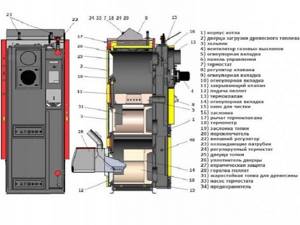
Combined heating boilers (gas, electricity)
Energy efficiency of equipment
What promises more efficient operation at minimal cost: gas heating or electric? In order to preliminarily estimate how much money will be spent on heating with these and other devices, it is necessary to make a calculation.
Gas equipment
This calculation of energy costs can be done in two ways:
- taking into account the maximum gas consumption, this parameter is indicated in the boiler passport;
- using specific heat of combustion indicators.
The first option can be called a rough calculation, the second is accurate, and therefore more suitable.
Calculation based on fuel consumption
For calculations, you can take one of the more popular boiler models. Anyone who has already looked at the model will be able to substitute specific data - its parameters. Here we consider a gas model with a power of 14 kW and a fuel consumption of 1.6 m3/h.
To get the daily flow rate, you need to carry out a simple operation: 1.6 m3/h multiplied by the number of hours in a day. 1.6 m3/h x 24 = 38.4 m3. The result is then multiplied by the gas tariff. In our case, we take the Moscow region: 4.90 rubles/m3. The result is: 38.4 x 4.90 = 188.16 rubles per day.
Calculation based on the specific heat of combustion of gas
The specific heat of combustion of gas is 9.3-10 kW/m3. In this case, 0.1-0.108 m3 of gas will be required for each kilowatt of boiler thermal power. To heat an average brick house (ceilings - 2.7 m, masonry of 2 bricks), located in the Moscow region, you need to provide 1 kW of thermal power of gas equipment for a certain area - 10 m2. These are considered to be the average heat loss of a given building.
If the described house has an area of 140 m2, then the heat loss will be 14 kW/h, and per day - 336 kW (14 x 24). To calculate the amount of gas consumed, you need to multiply:
- 0.1 is the volume of gas needed to produce 1 kW of thermal energy;
- 336 - daily heat loss (kW);
- 1.1 - with an efficiency of 90%.
The result - 36.96 m3 - remains to be multiplied by the tariff for the Moscow region: 36.96 x 4.90 = 181.1 rubles / day. The norm of 1 kW/10 m2 is designed for the entire heating season. It takes into account both the coldest days and the warmer ones, so expenses during the season will be equal to 181.1 rubles/day.
Electrical units
The coefficient of modern models of electric boilers is greater than that of gas units: it is 99 or 100% versus 70-95%. Therefore, at maximum load, the same boiler that was considered when calculating the energy efficiency of gas equipment will consume 14.14 kW. Since the difference is not too significant, in this case the power can be considered equal to the consumption of the electrical appliance.
To make the comparison almost “reference”, it makes sense to take as an example the same average brick house with an area of 140 m2. It is clear that the heat loss will be similar - 14 kW/h, and per day - 336 kW. To replenish them, the boiler will have to spend: 336 kW x 4.01 kW/h = 1347.36 rubles/day.
However, in this case, it must be taken into account that this is the maximum flow rate that can occur with heat loss of 14 kW. In reality, electric boilers operate 40 to 70% of the time, so costs are significantly reduced. If you round hundredths and tenths, you get from 538.8 to 942.9 rubles. However, the amounts are not reduced as much as equipment owners would like.
Which boiler is more profitable and economical?
A more accurate calculation can only be made regarding operating costs. It is important to consider that there are also costs for running a gas main to the house (from 200 to 500 thousand rubles), costs for design, installation and connection (from 5 to 50 thousand rubles), costs for organizing a three-phase electrical network (5-15 thousand). rubles) and other expense items, the amount of which always depends on the specific situation and is calculated individually.
We can only calculate and compare the costs of fuel that will presumably be spent on heating a private house with electric and gas boilers.
We calculate the energy efficiency of gas boilers
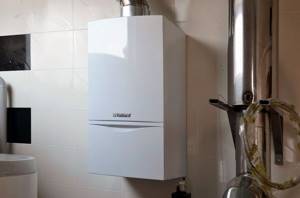
The energy consumption of a gas boiler necessary for comparison can be calculated in two ways: through the maximum consumption of natural gas (which is always indicated in the technical specifications) and through the specific heat of combustion.
For a rough calculation based on the maximum flow rate, let’s take as an example one of the most well-known models of gas boilers - BAXI ECO Four 1.14 F with a power of 14 kW, the maximum possible flow rate of which is 1.6 m3/hour. Per day this is 1.6 (m3/hour) * 24 (hours) = 38.4 m3. In value terms, according to the current tariff for natural gas in the Moscow region (from July 1, 2021) 5.7 rubles/m3 – 38.4(m3) * 5.7(rubles) = 218.88 rubles/day.
More practical and accurate is the calculation based on the specific heat of combustion of natural gas, which is 9.3-10 kW per m3. It follows that for 1 kW of thermal power of a gas boiler, about 0.1-0.108 m3 of natural gas is required.
To heat an average house with a masonry of 2 bricks and a ceiling height of 2.7 m, located in the climatic zone of the Moscow region, 1 kW of heating capacity of heating equipment is required for every 10 m2. This rule is based on the average heat loss (1 kW for every 10 m2) of the described house.
Let's say there is the above-described average house with an area of 140 m2, the heat loss of which will be 14 kW (per hour). Per day this is 14*24 = 336 kW. That is, the boiler needs to replenish 336 kW of heat loss, for this it will spend - 0.1 (m3, volume of gas to produce 1 kW of thermal energy) * 336 (kW, heat loss per day) * 1.1 (boiler efficiency 90%, exact value depends on the model) = 36.96 m3. In value terms, this is 36.96*5.7 = 210.67 rubles/day.
We recommend: Glass infrared heaters - operating principle, differences, how to choose, best models and manufacturers
Accordingly, the norm of 1 kW per 10 m2 is calculated taking into account the entire heating season. This means that heat loss, and, accordingly, gas consumption, will be maximum (218.88 rubles/day) with the highest heat loss of 14 kW on cold days or minimum on warmer days of autumn/spring. On average for the season for the house described above, it will still be 210.67 rubles/day.
We calculate the energy efficiency of electric boilers
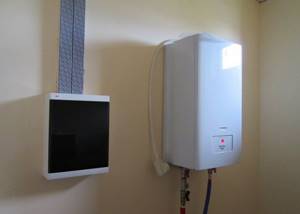
The photo shows a compact heating element Proterm Skat 13.
The efficiency of modern electric boilers is 99% or more, which means that at maximum load a 14 kW electric boiler will consume 14.14 kW of electricity. To simplify the calculations, we will not take into account the efficiency close to unity and assume that the consumption of an electric boiler = its power.
For a visual comparison, let’s take the same house with an area of 140 m2, the heat loss of which will be 14 kW (per hour). Per day this is 14*24 = 336 kW. That is, the electric boiler needs to replenish 336 kW of heat loss, for this it will spend 336 (kW) * 5.56 (rubles per 1 kWh, electricity tariff from July 1, 2021) = 1,868.16 rubles/day.
Accordingly, this is the maximum possible daily consumption of an electric boiler with a heat loss of 14 kW. In practice, the boiler unit operates only 40-70% of the time, so real costs will be in the range of 747.2 - 1,307.7 rubles/day , which is still a significant indicator.
What is ultimately more profitable: a gas or electric boiler?
From an economic point of view, even taking into account the costs of connecting to the gas main, the higher cost of gas equipment, installation and commissioning costs, a gas boiler is more profitable than an electric one and this is a long-known fact. It is confirmed both by rough calculations and in practice: heating a house with a gas boiler is cheaper and more economical, although not as practical, simple and comfortable.
However, electric boilers can be completely justified economically: in small private houses with an area of 40-60 m2, in which the actual cost of heating with electricity, according to reviews from the owners, is 5,000-9,000 rubles per month.
It is even more justified to purchase an electric boiler if you plan to stay in the house temporarily, for example, visiting for the weekend. Then the lower cost of the boiler itself and its connection will pay off the high operating costs for a long time. Especially if you resort to the saving methods described below.
Important parameters for choosing a heat source
Which heating is better? The answer to this question will depend on what you choose as evaluation criteria, but three conditions are unconditional for any type of heating:
- The amount of thermal energy must be sufficient to ensure the standard temperature in residential premises.
- Start-up and operating costs should be minimal.
- Heating should be simple and safe to maintain.
When choosing between gas and electric heating, it is necessary to take into account several important parameters:
- distance of the gas pipeline,
- availability of an electrical network with the required power,
- dimensions of the heated room,
- heat loss through windows and walls.
Whatever heating system you choose, the main factor in energy saving will be the thermal insulation of the room and the correct choice of highly efficient heating radiators.
Estimates and calculations
To determine the economic feasibility of using certain equipment in a particular case, it is worth contacting specialists and making thermal calculations. For a heated facility you need:
- draw up a list of required work;
- create an individual estimate and calculate the final cost of the heating system;
- calculate the amount of fuel required for the cold season;
- Calculate operating costs for the year.
The calculation takes into account the type of heated object, its footage and the level of thermal insulation. The features of the planned heating system also matter: only radiators or plus heated floors. It is necessary to initially find out for what purposes the boiler will be used: exclusively for heating purposes or additionally for heating water for domestic needs.
When using combined heating and hot water, the volume of hot water consumption should be approximately calculated. You should also take into account the frequency of power outages. Based on the information received, an objective decision is made in favor of a gas or electric boiler.
Description and principle of operation of electric heating boilers
Gas boilers are popular due to the low cost of fuel, but it is not always possible to connect them due to the labor-intensive procedure and the need for coordination with government agencies. Energy sources for solid fuel units are even cheaper, but there are many more disadvantages - they pollute, require the removal of combustion products, fuel loading, and storage space.
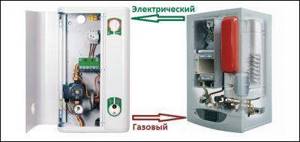
The listed disadvantages are absent in electric boilers, which are sometimes the only option for heating if there is no possibility of supplying gas. Moreover, electrical devices are considered not only as additional or emergency sources, but also as the main devices for the preparation of coolant. With them you don’t have to worry about ignition and other inconvenient issues associated with fuel combustion.
The most economical electric boiler should be chosen from energy-saving induction and electrode models. But we must take into account that in any case, its operation will cost approximately 2.5 times more than gas units, at best 1.5 times. Economy is considered here for situations where there are no other alternatives to electricity or if this type of energy is cheap (there are alternative sources - solar collectors, etc.).
What are the differences between gas and electric boilers
When choosing a gas or electric boiler for heating a private home, you first need to understand the features associated with the operation of each heating unit:
- The principle of operation is that in gas equipment, a coil passing directly above the burner is used to heat the coolant. Heating is carried out by flame from gas combustion. Household electric boilers use the principle of direct or direct heating of the coolant. The likelihood of an explosion (present in gas boilers) is completely absent.
- Stability of operation - an electric boiler requires a stable voltage in the network, which in domestic operating realities is not always possible. The gas pressure in the line may also fluctuate.
- Safety - gas boilers differ from electric ones in that the operation of the former is based on the constant ignition and extinguishing of the gas burner, which in itself is potentially dangerous. It is not surprising that strict requirements are imposed on the installation of gas equipment. Adjustment requires complex automation.
- Control - in this regard, an electric or gas boiler for heating a private house is not much different. If necessary, you can install a remote control unit, regulate operation using room thermostats, etc.
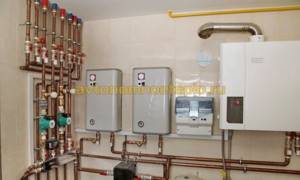
A starting point
To make an economical and safe payment, answer the following questions:
- How accessible are communications and what characteristics do they have, namely:
- whether there will be power outages;
- maximum value of electrical power;
- average gas pressure and its purity.
- What is your house: type of building, its footage, wall material and presence of insulation, % of heat loss, which rooms will be heated.
- What is required from the boiler? There are different situations: heating using radiators alone, or using heated floors; Is there a need for hot water based on the number of residents plus their average water consumption per month.
Only after this specialists will be able to decide what is suitable for you: a gas boiler or an electric boiler
When designing turnkey heating, it is important not only to familiarize yourself with the estimate, but also to require the organization to calculate monthly costs depending on which energy carrier has become your priority
Before installing the gas unit, you should find out:
- pressure level and quality of gas
- features and cost of connection
- the amount of time that may be needed to coordinate the work (from design to launch)
- how does the insertion take place?
When replacing gas equipment If you need to replace a gas boiler with an analogue, you should be prepared to present the specialists with a certificate for the unit and a heating system plan. Only after this the installation can be carried out.
Note! Electricity is safer than gas, and therefore the procedure for organizing heating will require the preparation of fewer documents, which will increase the speed of installation. As a rule, many residential property owners are dissatisfied with voltage stability.
It happens that the tension disappears and may not appear for a long time. This feature puts the gas boiler in first place, because such units are not so externally dependent. Therefore, to ensure uninterrupted operation of the heating system, it is additionally recommended to install a generator and batteries.
Disadvantages of gas heating
- If the house was not initially connected to the gas main, then the initial connection costs are so high that not everyone can afford it. And if the owner of a house with a plot of land does not foresee income growth in the future, then you can safely install an electric boiler. And don’t worry about the difference in the cost of energy carriers;
- Do not forget that gas is a rather explosive substance. And here, inevitably, you will think again before installing gas heating in your house;
- A gas water heating system is inconvenient for short-term use and takes too long to warm up (when the house is used sporadically during the colder months).
Comparison of gas and electricity costs. What is the price difference?
Let's try to make a simple calculation and see how much more expensive it is to heat a house with electricity compared to gas.
We will assume that a private house needs to be heated for five months a year. Let's take into account that there will be not only cold days, but also warm ones, so we divide the energy consumption by 2.
In total, it will take approximately 27,000 kW of energy to heat a house throughout the year.
Tariff prices of suppliers this year in the Moscow region are:
- 4.0 rub. for 1 cubic meter of gas;
- RUB 3.80 for 1 kilowatt of electricity.
It is easy to calculate that the cost of heating a house with electricity will be 102,600 rubles per heating season.
Disadvantages of electric heating
However, this system also has many negative aspects:
- Electricity is 7 (!) times inferior to gas in heat transfer efficiency . Simply put, a gas boiler needs 7 times less fuel to heat the same area;
- A stable voltage is required . The functioning of the system directly depends on the voltage in the electrical network (and in the private sector, interruptions occur quite often);
- Extremely high electricity consumption during the cold season . In order to warm up a room of 10 square meters, you need to spend a kilowatt of electrical energy. It turns out that to heat a house with an area of 150 square meters. m. it is necessary to constantly consume 15 kW (which in many towns and villages is the maximum power allocated to the site). And this is only for batteries, not counting other devices that consume electricity.
Of course, many owners are frightened by the prospect of paying tens of thousands of rubles monthly on electricity bills in winter. Is there any way to reduce these costs?
Yes it is possible. If you reduce heat loss in your home to a minimum by thoroughly insulating it inside and out, you can significantly reduce electricity consumption, and therefore heating costs.
You can also install a multi-tariff meter. Such meters allow you to use electricity more efficiently, depending not only on current consumption, but also on the time of day.
We recommend: Induction heating boiler for a private home: prices and types of heating units, induction boilers, induction boiler
In addition, do not forget about converter heating, where there is absolutely no need to spend money on a boiler, and the heating itself can be local.
Double-circuit gas boilers
Such boilers constructively separate the heating circuits of DHW and coolant, while sanitary water from the DHW circuit does not mix with technical water in the heating circuit. In our climate, they have two main operating modes:
- simultaneous maintenance of temperature in the hot water circuit and heating of the room in winter (or, if necessary, in cold summer);
- summer provision of hot water for household needs when heating is turned off (summer mode).
Operating modes can be controlled manually (for budget models) and automatically, depending on the situation outside the home (for advanced boilers). Double-circuit equipment is divided into two types: with a common or two separate heat exchangers.
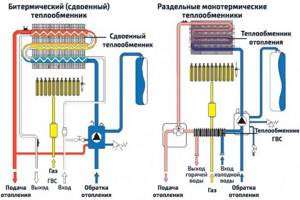
Differences between boilers with one bithermal heat exchanger and two separate monothermal ones.
What will have to be changed in the house to connect a gas boiler
Chimney
An electric boiler does not require a chimney, so it is most likely not included in the project. For gas equipment this is a mandatory part of the system. Discharge of combustion products into the ventilation duct is not allowed; a separate chimney duct, full thermal insulation, and protection of walls, ceilings and roofs from overheating are required.
There are 2 options:
The chimney is a difficult decision. Combustion products are discharged into the street above the roof. The smoke duct can stretch across the entire house. For boilers with an open combustion chamber.
A chimney (coaxial chimney) is a simple solution. Combustion products are discharged through the outer wall next to the equipment. For boilers with a closed combustion chamber. The chimney simultaneously removes combustion products and takes in air.
An additional advantage of a closed-type combustion chamber is that it does not waste oxygen from the rooms, does not affect existing ventilation, and reheats the outside air on its way to the boiler burner.
Boiler room
The installation location is regulated by MDS 41-2.2000 and SP 281.1325800.2016. If you are installing a gas pipeline, Mosoblgaz will help with technical specifications. The room must meet the requirements of the standards, or gas will not be supplied. If you are installing a gas tank (gas storage), choose a certified contractor.
The location directly depends on the power:
0-60 kW - allowed in the kitchen;
60-150 kW - in a separate room on any floor (also ground and basement);
150–350 kW - in a separate room on the first, ground or basement floors and in extensions;
above 350 kW - in an attached room with a separate entrance - “boiler room”, which is extremely rare for private houses.
A boiler room is not always needed
According to MDS 41-2.2000, a heater with a power of up to 60 kW can be installed in the kitchen or dining room. The main requirement is compliance with the following parameters:
The ceiling height of the room is from 2.5 m.
Volume - from 15 m³ + 0.2 m³ per 1 kW of power. For a 35 kW appliance, the kitchen volume must be at least 22 m³. With a ceiling height of 2.5 m, the kitchen area is from 8.8 m². For a boiler room, 15 m³ is enough (area - 6 m²).
Exhaust and air supply threefold + air used for gas combustion. At the bottom of the door there is a grille or gap with an area of 0.025 m².
Daylight. The window area is 0.03 m² for each cubic meter of volume.
An additional requirement for a boiler room is separation from adjacent rooms (living room, veranda, office) by enclosing fire-resistant walls.
Most kitchens in country houses fit the parameters. Remove the electric heater and install a gas boiler up to 60 kW. You will do without a separate room, although objectively the boiler room is more convenient - it is easier to control and maintain the equipment.
Which is better, more profitable: gas heating or electric?
This question can be answered quite simply. It is enough to compare the features of both types of heating:
- electricity - cheap installation, but expensive operation;
- gas - often a very expensive connection to the main line, but cheap operation.
If the main requirements of the owners are convenience and safety, then electric heating will be the best choice. When savings are a top priority, gas boilers are the preferred option, especially when considering this fuel in the long term.
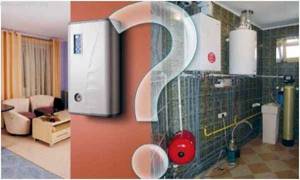
Even taking into account the costs associated with preparatory measures and the prices of gas equipment, this heating certainly remains a favorite. This fact is confirmed not only by rough or precise calculations, but also in practice. Yes, some claims can be made against gas boilers regarding the danger of the fuel, the complexity, as well as the high cost of laying the line and installation, or the relative inconvenience. However, there is simply no more economical option.
But electrical equipment cannot be called an outsider either. Its use in some cases is quite justified. For example, such boilers can be profitable purchases for heating systems of small buildings, whose area ranges from 40-60 to 100 m2. It also makes no sense to equip houses intended for temporary residence with gas boilers. In this case, you will have to wait a very long time for the equipment to pay for itself.
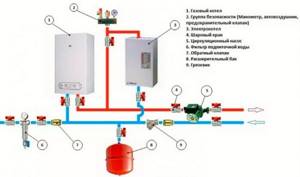
Which system to choose: gas heating or electric? If the house has a large area, and the owners have the opportunity and desire to connect to the main line, then it is better to opt for a gas boiler. When there is no such chance due to the lack of a gas pipeline nearby, other alternatives are considered. For example, the “golden mean” between gas and electricity is LPG cylinders or gas holders.
If the cottage is small, or it is intended only for seasonal living, and there are no serious problems with the power supply voltage, then the choice is obvious: this is an electrical appliance. Another option to consider is the use of such a boiler as additional, backup equipment in the “gas kingdom”.
To complete the topic, here is a video related to heating systems:
Which unit is more profitable?
When talking about the benefits of installing and using the unit, it is worth considering both the financial and operational components of the issue. First of all, you need to understand what is more economical: a gas or electric boiler. The solution to this issue is based on three sub-points:
- Fuel cost. Gas is constantly becoming more expensive. But, despite this, it still remains cheaper than electricity (tariffs for which are also growing all the time). If we take this factor into account, heating using gas will be more economical than electric. But if gas is not supplied to your site, all the advantages of this option will become useless. In this case, you will have to design electric heating. It is worth taking into account new achievements of electrical equipment manufacturers. After all, some brands began to produce models of electric boilers equipped with a storage tank with maximum thermal insulation. This container serves as a thermos for coolant. Using a boiler with a storage tank together with a multi-tariff meter, you can receive electricity at reduced rates.
- Cost of equipment. To understand which is more profitable: a gas or electric heating boiler, you need to take into account the prices for these devices in stores. If we compare products from domestic manufacturers, electric boilers are much cheaper than gas units with similar performance. The price difference can reach 40%. Such prices are relevant only for Russian brands. If you compare a domestic electric boiler with a foreign gas boiler, you will see that the cost of the second one will be almost 300% higher.
- Prices for installation and maintenance. When choosing a gas-fired boiler, you will have to register the device and prepare design documentation. These procedures are not provided free of charge. Their cost reaches tens of thousands in rubles. Prices vary in different regions of the Russian Federation. In addition, it is worth taking into account the costs of connecting the device and connecting the pipeline to it, if initially the pipeline did not go directly to the house. These works will greatly affect the efficiency of gas equipment. If we compare the electric model with the gas one, then the installation services for the first one will be less expensive. You will only have to allocate a separate line to connect the unit. You do not need permission to install it.
Electric heating boilers
When choosing an electric boiler, you need to take into account the following criteria: number of circuits, method of heating the coolant, design, power, design, cost. Domestic and foreign manufacturers are constantly improving heating equipment manufacturing technologies, so the buyer can purchase functional, practical, safe models at an affordable cost.
- Zota is a domestic product that is characterized by power and a high level of efficiency. Some models are equipped with a GSM module, which allows you to control them remotely.
- Evan is a Russian company that produces devices of excellent quality. Some units are fully automated, which significantly increases the efficiency and safety of operation.
- Protherm electric heating boilers operate on a two- or three-phase connection. The design of the models includes a hydraulic unit, an expansion tank, a pressure sensor, and various protective modules.
- The Vaillant company produces multifunctional heating devices. They are equipped with a reliable security system, are characterized by economical energy consumption, stylish, modern design.
Efficiency comparison
The efficiency of electric and gas units is on average the same. It may differ only for different models. For example, a classic gas boiler has an efficiency of 92%. If you measure this indicator for a condensation model, it can approach 108%.
Electric boilers from FERROLI and other manufacturers are more economical and efficient. After all, their efficiency is equal to 100%. But if the model operates on the basis of indirect heating of the coolant, its efficiency will be lower, since some of the heat will be lost during heating. That is, we can say that in terms of efficiency, electrode devices have the highest performance. All other devices provide approximately the same parameters.

Device comparison
Moving away from energy efficiency parameters, you need to remember the advantages and disadvantages of both devices. Among the advantages of electrical equipment are the following features:
- Wide power range (2-60 kW). From these you can choose models up to 20 kW, suitable for individual heating. Thus, the miniature Tenko economy KE 6_220 with a power of 6 kW will heat the average apartment up to 68 m². There are also more powerful 30 kW options, such as Vaillant eloBlock 28 kW with a heating area of about 200 square meters. Such units satisfy the needs of industrial and commercial facilities.
- Environmental friendliness is another advantage of the technology - it does not produce emissions of combustion products.
- Variability: electric boilers heat water. Such devices are easy to operate, silent, reliable, and durable.
As disadvantages, we cannot keep silent about:
- High amounts of energy payments.
- Outlet dependencies.
- Electrical wiring required.
If we talk about gas analogues, then they also have their own characteristics. So, the advantages of gas-powered boilers:
- The power of gas equipment is enough to heat objects of colossal size. Model NOVA FLORIDA CATU32MF99 will heat 1000 m2!
- Gas in automatic boilers is supplied continuously; they will turn off as soon as the fuel supply stops (which happens infrequently, unlike the supply of electricity).
- Easy to use. The equipment is designed for long-term operation.

There were some downsides:
- A complex installation that comes with many nuances. You will have to touch on the technical side of the issue and the bureaucratic side, drawing up the appropriate documentation, permits, and approvals.
- The need to equip a chimney that removes waste substances.
- The need for good ventilation and separate access to the street.
- There is no benefit from installing such boilers in rooms up to 100 m2.
Let's summarize what has been said. Our calculations have finally decided: the efficiency of an electric boiler is beyond doubt, although its gas counterpart with a condensing mechanism competes with it in energy efficiency.
Don’t forget about the increased efficiency of an electric boiler - it is 25% higher than that of a relatively cheap gas device, for example Ferroli DivaProject. All this says one thing: feel free to choose an electrode boiler if you need to heat an ordinary apartment up to 100 square meters, and you won’t regret it!
Related video: Heating a home is four times cheaper than a gas boiler
https://youtube.com/watch?v=mXelnJ7oLZI
Advantages of electric heating
According to many developers, heating with electricity is more profitable for owners of country houses, since this does not require connecting to the main gas pipeline, which, moreover, is not available everywhere.
This system does not require large start-up costs, and the advantages are obvious:
- Easy installation. Installing an electric boiler is quite simple - you can do it yourself. This does not require a separate boiler room, nor does it require coordination and registration of equipment installation with inspection authorities;
- Can be equipped quickly and cheaply. There is no need to spend money and time on preparing and obtaining a project, technical conditions, or waiting for the commissioning certificate;
- No excavation or pipe laying required;
- There is no need to equip a chimney and sensors that should monitor safety and smoke;
- Higher safety and environmental friendliness. There is no risk of explosion from electric boilers; they do not emit carbon monoxide or form combustion products;
- The system is very easy to operate , and electric boilers are more convenient to use.
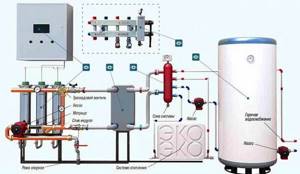
Types of boiler ignition methods and which method is the most optimal?
There are three ignition options:
- electronic. The burner is ignited at the touch of a button using a special unit. This option is present on all models of volatile boilers;
- piezoelectric. The principle of operation of such a system is similar to all piezo devices - in order for a spark to appear, you need to press on a special crystal. Used on non-volatile boilers. Many users find this type of ignition inconvenient;
- manual. The flame is ignited with an ordinary lit match (spear). For ignition, you need to have a certain supply of such elongated wooden sticks.
Most users unanimously prefer the electronic type of ignition, but it is not possible on non-volatile units. You have to get used to using a piezoelectric element or ignite the burner with a burning torch.

Ways to significantly save fuel
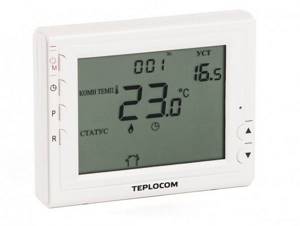
A programmable room thermostat controls the operation of the boiler in priority mode and focuses on measuring the air temperature in the room in which it is installed, and not on the coolant temperature. However, the main and most important task for saving purposes is the programming mode of work settings for the next day and week. For example, during working hours when the owners are away from home, you can set the temperature to 15°C. And during sleep – 18 or 19°C. Such parameters will not affect comfort, but will significantly reduce the final consumption.
An indispensable element when heating with an electric boiler is an electric meter that differentiates electricity consumption by two, or better yet, by three time zones. For example, for the Moscow region the following tariffs are differentiated by time zones:
- peak zone (from 7:00 to 10:00 and from 17:00 to 21:00) – 5.06 rubles per 1 kWh;
- half-peak zone (from 10:00 to 17:00 and from 21:00 to 23:00) – 3.89 rubles per 1 kWh;
- night zone (from 23:00 to 7:00) – 1.68 rubles per 1 kWh.
Summarizing all of the above
Weighing all the pros and cons, all the pros and cons, we can definitely say the following: if the house was purchased with gas heating already connected, then of course it is not worth changing it.
If you are not ready to invest almost a million rubles in your house so that it has gas, and the speed of heating the rooms is also important to you (in this regard, gas heating loses to electric heating), it is better to give preference to electric heating.
The fact is that electrical systems do not have this drawback, especially if you use a boiler-air system. The whole trick of quick warming up is convection - room air is taken in by the system, then heated and returned to the room, taken in again, and so on in a circle. Such systems are characterized by very high efficiency - and produce more heat than they consume energy.
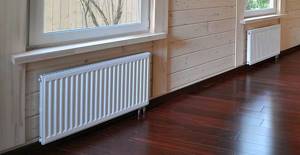
In terms of monthly expenses, heating a house with gas is definitely more profitable than with electricity: the cost of heating the same area is 7 times cheaper.
However, taking into account all the costs of equipment, connection and maintenance, the difference is no longer so obvious. And in some cases (for example, when the gas main is located too far away, or when the house is used only for short-term recreation), electric heating looks like a more preferable solution.
Buy a gas or electric boiler
Gas or electricity? Which heating is more profitable and cheaper for a private home? on the Nedvio website
- Real estate
- Construction
- Repair
- Plot and Garden
- About country life
- Questions and Answers Interactive cadastral map
- About the Nedvio project
- Advertising on Nedvio.com
Which heating is cheaper and more profitable for a private home: gas or electric?
Many will immediately say: of course, gas! It is several times cheaper, and having a gas pipe nearby is the dream of every summer resident. In fact, not everything is so simple. In most cases, it is actually more profitable to heat a house with gas than with electricity. But this is if you compare these two methods in terms of the size of monthly bills. If you take into account all the costs, including connection, equipment and operation, the electrical system often looks more profitable.
In this article we will try to understand this issue objectively. And to do this, you need to thoroughly study all the pros and cons of both heating systems and compare all costs.
Electric heating boilers
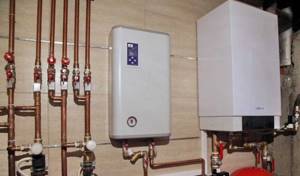
Electric heating boilers differ in the type of installation and can be installed in a wall or floor version.
Interesting! Exclusively heating boilers, whose power does not exceed 60 kW, can be mounted on the wall, and more powerful ones - only on the floor.
Electric boilers are connected to a standard single- or three-phase electrical network, and water from a regular plumbing system, specialized oils or antifreeze can be used as a filler for the heating system.
Important! Only devices with a power of less than 12 kW can be connected to a single-phase network. Electric heating boilers differ in the method of heating the coolant
Main types:
Electric heating boilers differ in the method of heating the coolant. Main types:
- Indirect heating. In these devices, heating occurs through the use of a heating element located in a heat exchange tank.
- Direct heating. The coolant is heated by the heat generated by a pair of electrodes lowered into the water.
- Induction energy saving.
Boilers TEN
In these devices, heating of the coolant is carried out by converting electrical energy into heat through a tubular heater located in the heat exchanger. Heating element boilers work with any coolant and regardless of their initial temperature. The required level of pressure is created thanks to the circulation pump.
Interesting! You can significantly reduce heating costs by installing special temperature sensors on radiators.
Boilers using heating elements can be either single-circuit or double-circuit and are used to supply hot water.
The main disadvantages of such boilers are:
- Burnout of TEN, which implies its replacement.
- Scale formation on the heating element. This occurs due to the use of low quality hard water and leads to loss of power and breakdown of the heating element.
Important! The service life of the boiler can be significantly extended by using special water softeners.
Electrode type boiler
The principle of operation of such boilers is that electric current passes through the coolant directly, which causes heating. Electrode boilers are characterized by efficiency and reliability. Compared to TEN, real energy savings are up to 40%. An undoubted advantage is the absence of the possibility of scale formation, since there is no such fuel element, only a cathode and anode through which an electric current is passed.
The device of this type of boiler does not require the installation of a circulation pump and a large heat exchanger tank, which makes the device quite compact.
The coolant heats up in a very short period of time, and the efficiency reaches 95%. Electrode-type boilers are very reliable, durable, energy-saving and economical, but there are some disadvantages:
- Inability to connect to the power grid via RCD.
- It is necessary to use only special antifreeze liquids supplied by the boiler manufacturer as a coolant.
Resistive energy-saving electric boilers
The least known representative of electric heating boilers, similar in principle to electrode boilers. The direct heating element is a metal tube coated with a layer of tungsten, which heats the water. This method is called electromagnetic induction.
Despite their little popularity, boilers of this type have a number of advantages,
- You can use ordinary tap water as a coolant.
- High power due to the absence of a thermal barrier.
- Cost-effective and high level of energy saving.
Which is better in terms of practicality and comfort: gas or electric boiler
A well-known fact is that electric boilers in the middle price category and above (from 25 thousand rubles) are almost ideal in their simplicity, functionality and ease of use. They do not require a separate room for a boiler room, ventilation or chimney, are environmentally friendly, have functional automation, and are completely autonomous. In addition, due to the simplicity of the design, they are extremely reliable, even in the event of a breakdown, the cost of heating elements or a full-fledged heating unit averages up to 10-15% of the cost of the boiler.
In terms of installation, operating comfort and safety, modern electric boilers are not only better than gas ones, but are also leaders among all existing types of boilers. To make the comparison as comprehensive and clear as possible, we have summarized all the features and differences of gas and electric boilers into one table.
| Parameter |
Natural gas boilers |
Electric boilers |
| Necessity for registration | — Mandatory registration is required: obtaining a permit, developing a project, concluding an agreement with the gas supply company and approving the work done | + With a power of up to 10 kW, no documentation is required - With a power of over 10 kW, according to the PUE (7th edition), approval of the installation with the Energy Supervision authorities is mandatory |
| Difficulty of installation | — Requires gas mains to be connected to the house — Atmospheric models require the organization of a sufficient air flow for gas combustion (natural and sometimes forced ventilation) — Traditional or coaxial chimney required — Usually the boiler piping is quite complex | + It is enough to hang the boiler on the wall using a standard mount, connect the supply and return lines of the heating system to it — Models with power over 6 kW must be connected to a three-phase (380 V) power supply — Grounding is mandatory, and connection via an RCD (residual current device) is also required. |
| Reliability | — Inexpensive models with a steel heat exchanger are relatively reliable, but the resource of such heat exchangers is limited to 12-14 years + Models from well-known manufacturers with a cast iron heat exchanger are highly reliable and last for 15 years without a single breakdown. + Non-volatile gas models operate stably, gas pressure is always within the permissible deviation limits. Even volatile models in the event of a power outage operate without problems from a simple 1 kW generator | + In a simple design (heating unit in which the heating element and automation are placed) there is simply nothing to break. The only vulnerable element is the heating element block, which is overgrown with scale. The service life of electric boilers made from high-quality alloys is practically unlimited - In the event of power outages, it is almost impossible to provide power to a boiler with a capacity of 12.16, 24 or more kW in domestic conditions |
| Functionality and ease of use | - Inexpensive models have only a step power regulator (7-10 steps) - More subtle settings and the ability to program the operating mode for the next day and week are available only in fairly expensive wall-mounted models (from 29-40 thousand rubles) | — The most budget models are also equipped only with stepped power regulators (3-6 steps) + Models costing from 20 thousand rubles. have degree-by-degree temperature control, finer settings, are often equipped with a built-in operating mode programmer or come with an external room thermostat |
| Safety | — In general, serious malfunctions can lead to gas leakage, creating a serious emergency situation. Possible boiler explosion. — Inexpensive models only have a gas control system that stops the gas supply in case of problems with pressure or traction + Models in the mid-price segment and above are equipped with protection against overheating, freezing of the heating system, and stopping the circulation pump | + In general, if grounded, they are not capable of causing harm to human health or creating a serious emergency situation + Most models are equipped with protection systems against overheating, freezing of the heating system, and stopping the circulation pump |
| Maintenance and repair | — They require regular maintenance, it is desirable: annual cleaning, flushing the heat exchanger every 4-7 years, annual chimney cleaning — Repairs, without special skills, are most often impossible to do on your own. The design includes many more elements, many of which are expensive | + They do not require regular maintenance and cleaning, the only problem is the formation of scale on heating elements when using untreated hard, replaceable water - You can replace heating elements yourself, their cost ranges from 3-7 thousand rubles, depending on the model |
| Model selection | + There is a large selection of floor and wall, single-circuit and double-circuit models on the market | — The choice is limited only to wall-mounted, in 90% of cases single-circuit models |
It is also worth considering that the body of electric boilers (with the exception of the most budget ones) already contains all the necessary elements of the heating system, such as an expansion tank, circulation pump, automatic air vent, safety valve, etc. Among gas boilers, only wall-mounted models are distinguished by such equipment (of the floor-standing ones, only some boilers in the highest price segment).
In practical comparison, electric boilers are an almost ideal heating equipment option, incomparable to gas ones. However, not everything is so simple, if we take into account the economic side of the issue.
Let's compare networks
Electricity
The undeniable advantages of electric boilers:
- there is no need to constantly be in the house while the boiler is operating and clean it;
- no additional communications or storage required;
- automatic shutdown is triggered in the event of a short circuit in the network or elevated temperature conditions.
Be sure to find out the condition of internal and external electrical networks, incl. “free” power of the transformer substation, which is located near your home, how uninterrupted the power supply to your area will be; Will it be possible to install a cable with a voltage of 380 V (three-phase) for construction?
Which heating is more profitable?
If you compare 2 types of boilers for their efficiency, then you should take into account not only the cost of the energy carrier, but also all the costs necessary for installing the heating system.
To calculate the energy efficiency of using different types of equipment, you need to calculate the gas and electricity consumption for heating the coolant during operation of the heating system.
Energy consumption is indicated in the technical specifications of the equipment. If you need to heat a room 5 months a year, then for a house of average size you will need to spend about 27,000 kW of electricity, which is 63,000 rubles at current electricity prices.
When heating a similar house with a gas boiler, you will need to spend about 14,192 rubles per year for these purposes.
From an economic point of view, installing a gas unit is more profitable, even taking into account:
- costs of connecting to the main gas pipeline;
- high price of the device;
- high cost of commissioning work.
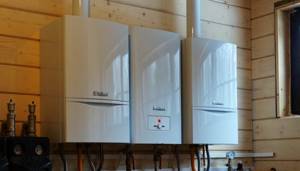
Heating residential premises with natural gas is cheaper. A minor drawback can be considered a lower degree of practicality and comfort in using such a boiler.
Installing electric heating systems can be beneficial in small buildings whose area does not exceed 40-60 square meters. m. Installation of an electric boiler is justified in houses where you plan to live temporarily or where you plan to visit only on weekends.
In such a situation, the low connection price and low cost of equipment allow you to quickly recoup the costs of equipping your home with a heating system. The use of various methods of reducing energy consumption allows you to save a lot of money on heating residential premises.
To reduce energy consumption to maintain a comfortable microclimate in the house in the absence of the ability to program the operation of the heating system, it is recommended to connect a room thermostat to both the gas and electric units. This device allows you to regulate the operation of the boiler not according to the degree of heating of the coolant in the line, but according to the air temperature in the room.
When using electric equipment for heating, it is advisable to install a 2- or 3-tariff meter, which will also reduce the cost of maintaining the microclimate in the room. The costs of purchasing, installing and designing the device are recouped in a few months by reducing energy costs by 15-20%.
Ease of use
The operation of modern boilers, regardless of the type of fuel, does not cause any difficulties
Ease of maintenance and use is an important characteristic. The consumer pays extra for convenience.
Electric boiler
The device is equipped with a control module and multi-stage automatic safety system. The setup is extremely simple and is carried out by the consumer himself. If the device is equipped with a programmer, you can also set the operating mode - for example, reducing power at night, on and off times, etc.
Gas holder
Operating the gas tank itself is also not difficult. The tank operates in automatic mode. The owner periodically checks the fuel level using the sensor and, if necessary, buys a gas mixture. The download is performed by the supplier.
Disadvantages of heating with electricity
Unfortunately, there are also quite a few of them.
- Huge electricity bills. We should not forget that electricity is the most expensive type of fuel.
- Dependence on weather. If a wire breaks somewhere due to wind or ice, you will be left without heating.
- Low power of devices. Electric boilers with a power sufficient to heat large areas simply do not exist. If you have a large cottage with several floors, you will have to install a gas tank and buy LPG .
- A three-phase power supply (380 Volts) is required. In some settlements, especially remote ones, this simply may not exist.
Cost of heating equipment
Approximate estimate for a house with an area of 100 meters2:
| Electric boiler and water heater | |
| Aluminum radiator (64 sections, 340 rubles each) | 21 760 |
| Accessories for radiators | 5 600 |
| Materials for heating installation | 11 000 |
| Electric boiler 9 kW | 9 110 |
| Circulation pump | 3 000 |
| Water heater 80 l | 7 500 |
| Total materials: | 57 970 |
| Heating system installation | 28 000 |
| Double-circuit gas boiler | |
| Aluminum radiator (64 sections, 340 rubles each) | 21 760 |
| Accessories for radiators | 5 600 |
| Materials for installation of heating, boiler room | 10 000 |
| Gas double-circuit boiler 11 kW + chimney | 28 100 |
| Total materials: | 65 460 |
| Installation of heating system, boiler room | 30 000 |
The average cost of equipment for an electric boiler and a double-circuit gas boiler does not differ significantly and is approximately 58-65 thousand rubles. The cost of installation work will be about 28-30 thousand rubles.
Environmental friendliness and safety of gas and electric boilers
In terms of these two parameters, the clear leader is models operating on electricity. Let's compare both options:
Operation and installation of gas and electric boilers
When deciding whether a gas or electric boiler is better, let’s talk about installation, maintenance and operation. In terms of ease of operation, electric heaters also benefit. They do not require the same preparation as gas ones before starting. Therefore, the choice in their favor is completely justified.
- Gas. Ease of operation directly depends on the cost of the product. Only expensive models have automated operation. A complex installation of a system with pressure gauges, a chimney, and an exhaust hood is required. To install the boiler, you need additional space adapted for these purposes.
- Electrical. The models are automated. Easy installation. There is a possibility of heating water. You can install the equipment in any convenient place.
Which boiler is more economical - gas or electric?
When choosing which boiler is more profitable, gas or electric, it is worth considering the prices of the models and the feasibility of the costs. In both categories you can find suitable options for the price - middle-class equipment at an affordable cost. Of course, you will have to pay more for excellent quality. This same fate also awaits owners of large houses.
Prices for a gas or electric boiler depend on the manufacturer, the availability of additional components and many other technical issues. Also, to make sure whether a gas or electric boiler is more economical, you need to compare them in terms of energy costs.
Boiler efficiency comparison:
Electric
The cost of blue fuel and electricity is constantly growing, but the price of gas is much higher and rising faster than the cost of a kilowatt of electricity. Therefore, in terms of feasibility, it is best to purchase electrical equipment. It has high efficiency and pays for itself faster.
Conclusions and useful video on the topic
Work on bringing gas into a house and its cost using the example of a house in the Perm region:
About tariffs for using electricity to heat a house located within the city. Legal and technological nuances:
The use of gas and electricity when heating a house has its own characteristics. Electric heating equipment is easier and faster to connect, and natural gas is cheaper as a fuel. To determine the best economic model for heating, you need to carry out calculations for a specific object and draw up a schedule of financial costs.
Would you like to share your own opinion about the most rational and practical heating system? Do you have useful information on the topic of the article that is worth sharing with site visitors? Please leave comments in the block form below, ask questions, post photographs.
Which boiler is more convenient and easier to use?
Only the most expensive models of gas boilers are equipped with an automated configuration system. The higher the cost of a gas boiler, the simpler the system for adjusting it. For trouble-free operation of gas equipment, precise settings are required, and even minor failures can lead to system shutdown.
Electric boiler
Electric boilers are equipped with a fully automatic control system, and safety of use is monitored by built-in sensors, ensured by grounding and installation of a residual current device.
In settlements near which a central gas main is located, it is more advisable to use gas for heating the area. In all other cases, the installation of electrical equipment is considered rational.
This article is advisory and is not a guide to choosing a particular system. Answer to the question: Which is cheaper and more convenient to use: heating with gas or electricity? It is decided on an individual basis.
Why is an electric heating boiler better than a gas one?
Despite the fact that gas is a cheaper source of energy than electricity, installing gas equipment is not always preferable. The main obstacles to installing a boiler of this type are:
- Difficulties with obtaining permission, coordination and preparation for installation. The room must have a properly organized ventilation system and removal of combustion products.
- High cost of equipment and labor intensive installation. And if we are talking about a private house where gas is not supplied, then the costs increase significantly.
- Potential danger of the fuel itself and its combustion products.
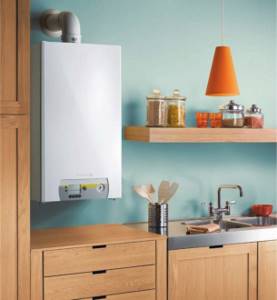
Advantages of electric heating systems
Electric boilers have many advantages, including:
- High reliability in terms of fire safety (of course, subject to the availability of high-quality wiring and fuses).
- Low installation costs, easy installation.
- Wide price range, choice of functions. In general, electric models are cheaper than gas models. You can choose a simple boiler, consisting of a set of heating elements and a primitive control system, which will cost very little. If there are no financial restrictions, you should pay attention to automated devices. They are able to maintain a given temperature with minimal energy consumption and have several programming modes, a GSM controller that allows you to regulate the operation of the device from a distance, and other useful options.
- Compact and aesthetically pleasing. In many modern models, all the necessary elements - a circulation pump, an expansion tank, an air vent, protection systems - are hidden inside the housing. If desired, the electric boiler can be installed in any room of the apartment. The most common are wall-mounted varieties.

- Ease of use. To control the device you only need to press a few buttons. Electric boilers do not require control or participation in their operation.
- Silence. The owners can only hear the quiet hum of the induction device or the hum of the automation units.
- There is no need for coordination with relevant organizations when the device power does not exceed 9 kilowatts.
- High efficiency.
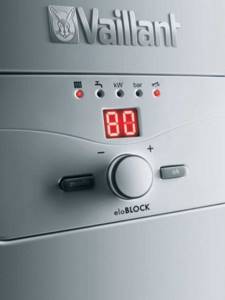
Induction devices
Induction boilers are energy-efficient and reliable devices that can operate for years without maintenance or repair.
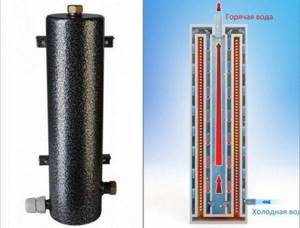
Pros:
- thanks to the phenomenon of self-induction, they significantly save energy (up to 30% during the heating season);
- undemanding to the composition of the coolant (scale does not appear in such boilers);
- service life - from 30 years, the likelihood of breakdown due to the design features is very low;
- quick heating of the coolant;
- possibility of precise adjustment.
Minuses:
- large mass (from 30 kg) - strong brackets are used for hanging, the wall must be able to withstand the load;
- circulation pump, expansion tank, safety group are purchased and installed separately;
- relatively high cost;
- vibration noise during operation.
Combination boiler gas and electricity balanced choice of heating
Installing a combined heating system allows you to economically and efficiently heat rooms in autonomous mode and expand the services received.
Important advantages of the combination heater:
- has small dimensions;
- has excellent efficiency;
- reduces the cost of thermal energy production;
- automatic switching of gas or electricity supply modes;
- reduces environmental load.
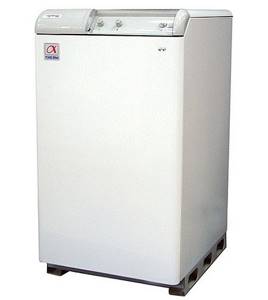
3 Gas-electric boiler Its most effective operation can be achieved when a combined gas and electric heating system is designed at the stage of construction and equipment of premises. Professional installation and commissioning of combined equipment will also increase the quality and long-term service of the gas and electric heating circuit.
Gas-electric heating boilers not only allow you to heat water for supply to heating radiators, but also combine several functions at once. Combination boilers can be responsible for the operation of the “warm floor” system and heat water for domestic purposes. Additional heat exchange units will maintain the water at the proper temperature in the pool, and installing a boiler will meet the needs for hot water.
Types of heating elements
There are 3 types of heaters: heating elements, electrodes and inductor. In a tubular electric heater (TEH), a nichrome or fechral spiral placed in a tubular shell is used as a working element. A dielectric with good thermal conductivity, for example, periclase - magnesium oxide, is placed between the walls of a steel, copper, brass or ceramic tube and the working element.
Heating elements are characterized by high power consumption and lower reliability. Deposits on heating elements reduce efficiency and lead to their rapid failure. Such heating elements must be changed periodically (every 2-3 years).
Electrodes are often plates immersed in a coolant or solution, but not in clean water. The efficiency here is slightly higher compared to heating elements. The problem with electrode boilers is scale.
Induction heating boilers are economical, efficient, and reliable. But in terms of water heating speed they are inferior to the previous two types.
Induction
